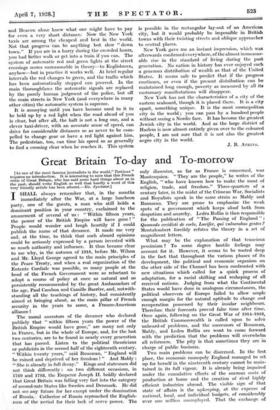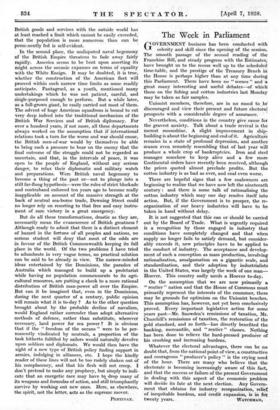Great Britain To-day and To-morrow
[As one of the most famous journalists in the world," Pertinas " requires no introduction. It is interesting to note that this French critic of Great Britain, who has said some hard things about us in the past, should write English so well that hardly a word of this very friendly article has been altered.—En. Spectator.] ISHALL always remember that, in the months immediately after the War, at a large luncheon party, one of the guests, a man who still holds a dominant position in your country, exclaimed to the amazement of several of us : " Within fifteen years, the power of the British EmPire will have gone ! " People would wonder and laugh heartily if I could publish the name of that dreamer. It made me very sad, at the time, to think that such absurd opinions could be seriously expressed by a person invested with so much authority and influence. It thus became clear to me why, in the autumn of 1918, before Mr. Wilson and Mr. Lloyd George agreed to the main principles of the Peace Treaty, and when a real organization of the Entente Cordiale was possible, so many people at the head of the French Government were so reluctant to adopt a course of policy at once so natural and so persistently recommended by the great Ambassadors of the age, Paul Cambon and Camille Barrere, and, notwith- standing all the teachings of history, had consistently aimed at bringing about, as the main pillar of French security in the years to come, a Franco-American alliance !
The moral ancestors of the dreamer who declared publicly that " within fifteen years the power of the British Empire would have gone," are many not only in France, but in the whole' of Europe, and, for the last two centuries, are to be found in nearly every generation that has passed. Listen to the political theoricians or publicists in the second half of the eighteenth century. " Within twenty years," said Rousseau, " England will be ruined and deprived of her freedom ! " And Mably " She is already in full decay." Kingi and statesmen did not think differently : on two different occasions, in 1769 and 1788, the Emperor Joseph II. boldly declared that Great Britain was falling very fast into the category of second-rate States like Sweden and Denmark. He did not see any future for her except under the domination of Russia. Catherine of Russia reproached the English- _men of the period for their lack of nerve- power. The only dissenter, as far as France is concerned, was Montesquieu. " They are the people," he writes of the English, " who have known how to make the most of religion, trade, and freedom." Three-quarters of a century later, in the midst of the Crimean War, Socialists and Royalists speak in the same strain as Mably and Rousseau. They are prone to emphasize the weak spots of a government which keeps aloof both from despotism and anarchy. Ledru Rollin is then responsible for the publication of "The Passing of England " ; Quomodo ceeidisti de coelo, Lucifer, qui vulnerabas genies ? Montalembert forcibly refutes the theory in a set of magnificent letters.
What may be the explanation of that tenacious pessimism ? To some degree hostile feelings may account for it. However, it seems to be rooted deep in the fact that throughout the various phases of its development, the political and economic organism on the other side of the Channel has been confronted with new situations which called for a- quick process of adaptation, for a racial shifting and reshaping of all received notions. Judging from what the Continental States would have done in analogous circumstances, the political observers of Europe failed to allow ample enough margin for the natural aptitude to Change and recuperation possessed by their insular neighbours. Therefore their forecasts proved &lie time after time. Once again, following on the Great War of 1914-1918, the British Commonwealth is called upon to solve unheard-of problems, and the successors of Rousseau, Mably, and Ledru Rollin are wont to come forward with the prediction that the problems will Overwhelm all reformers. The pity is that sometimes they are in charge of public business.
Two main problems can be discerned. Iii the first place, the economic -monopoly England managed to set up for herself in the nineteenth century cannot be main- tained in its full' vigour. It is already being impaired under the cumulative effects of the onerous costs of production at home and the creation of rival highly efficient industries abroad. The visible sign of that state of ' affairs is the upkeeping, at the expense of natiOnal, local, and individual budgets, of considerably over one Million unemployed. That the exchange of British goods and services with the outside world has at least reached a limit which cannot be easily exceeded; that the population is more numerous than can be permtmently fed is self-evident.
In the second place, the undisputed naval hegemony of the British Empire threatens to fade away fairly rapidly. America seems to be bent upon asserting its Might across the oceanic expanses on terms of equality with the White Ensign. It may be doubted, it is true, whether the construction of the American fleet will proceed within such narrow time limits as "some readily anticipate. Pantagruel, as a youth, mentioned many undertakings which he was not patient, careful, and iiiigle-purposed enough- to perform. But a while later, as a full-groWn giant, he easily carried out most of them.
The advent of huge American squadrons is bound to cut very deep indeed into the traditional mechanism of the British War Services and of British diplomacy. For over a hundred years, if not more, all these departments always worked on the assumption that if international relations took a turn for the worse and war should' ensue, the British men-of-war would by themielves be able to bring such a pressure to bear on the enemy that the final outcome of the struggle could not be regarded as uncertain, and that, in the intervals of peace, it was open to the people of England, without any serious danger, to relax their diplomatic and military watch and preparations. Were British naval hegemony , to become a thing of the past or—not to plunge into a still far-flung hypothesis—were the rules of strict blockade and contraband enforced ten years ago to become really inapplicable on account of the massive strength at the back of neutral sea-borne trade, Downing Street could no longer rely on resorting to that free and easy instru- ment of sure victory in a great emergency.
But do all these transformations, drastic as they are, necessarily mean the evanescence of British greatness ?
Although ready to admit that there is a distinct element of hazard in the fortune of all peoples and nations, no serious student will deny that most of the odds are in favour of the British Commonwealth keeping its full place in the world. Of the two problems I have tried to adumbrate in very vague terms, no practical solution can be said to be already in view. The narrow-minded ideas entertained by the Dominions, the paradox of Australia which managed to build up a proletariat while having no population commensurate to its agri- cultural resources, are putting a check to a more rational distribution of British man-power all over the Empire.
But can it be imagined that, even in the Dominions, during the next quarter of a century, public opinion will remain what it is to-day ? As to the other question brought about by the probable decline of navalism, would England rather surrender than adopt alternative methods of defence, rather than substitute, wherever necessary, land power for sea power ? It is obvious that if the " freedom of the oceans " were to be per- manently vindicated by neutrals, a proportion of the task hitherto fulfilled by sailors would naturally devolve upon soldiers and diplomats. We would then have the sight of a new type of British policy finding support in armies, indulging in alliances, etc. I hope the kindly reader of these lines will not be too rudely shaken out of his complacency, and that his flesh will not creep. I don't pretend to make any prophecy, but simply to indi- cate that an energetic race may have to drop many of its weapons and formulas of action, and still triumphantly survive by working out new ones. Here, as elsewhere, the spirit, not the letter, acts as the supreme mover.
PERTINAX.







































 Previous page
Previous page